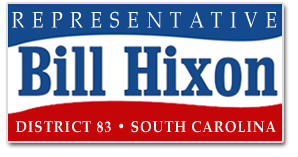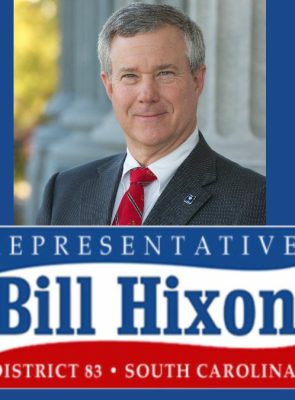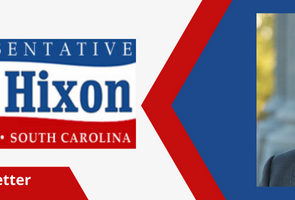Roads Bill Passes & Sine Die
Sine Die (Latin meaning “without a fixed day”) Adjournment occurred this past Thursday, May 11, 2017, at 5:00 pm and marked the end of this year’s general legislative session. For a bill to have become law this year, it would have needed to pass both legislative chambers by Sine Die. This always adds increased pressure in the final week of legislative session.
While some of my House colleagues and I helped pass many significant pieces of legislation last week, the most anticipated action was the passage of a bill to fix our roads and bridges. H-3516 passed the House 99-20. The House and Senate hammered out an agreement that had enough support to pass both legislative bodies.
When I ran for the House in 2010 I made a promise to you to stay in touch with you, listen to your advice and concerns, then make the best decision based on facts and numbers, and vote on the bill that best fits my district and state. After years of meetings and reviews of SCDOT our state budget and revenues, the best way to keep our roads in good repair is to ask those who use them to help pay for the up keep. Non residents will pay 30-32% of this revenue. The best way to fix our roads and bridges in this state is to raise the gas fee 2 cents per gallon a year for 6 years, totaling a max of 12 cents per gallon. At the end of the 6 years (2023) our gas fee will be 28.75 cents per gallon. This will result with a total of $625 million per year to go towards fixing our roads and bridges. Not one person I talked to want to live in 2017 on a 1987 income. “Just fix the roads” I was told. These reasons are why I voted yes to the roads bill.
Old Gas Fee Formula
Below is the present 1987 funding of the 16.75 Motor Fuel User Fee. There is less than ONE CENT left to fund state system needs after requires transfers to other entities, matching money for federal highway dollars, and daily highway maintenance costs.

Reforms the Department of Transportation (Starting July 1, 2017)
Reform/Governance
* 9 Highway Commissioners – 7 District and 2 At-large
* All appointed by the Governor and sent to the Senate and the House
* 7 District appointees approved by a separate weighted vote of only the Senators and a separate weighted vote of only the Representatives of district legislative delegations
* 2 At-large via advice and consent of the General Assembly
* Commissioners may be removed from office by the Governor without legislative approval
* Commission is removed from the day-to-day operations of the department; requires Commission to hold at least 6 meetings annually with one week notice, and publish reports/audits online
* Prohibits Commissioners from participating in the awarding of contracts, selection of consultants or contractors, etc
* Commissioners cannot have direct or indirect interest in any contract during term or up to 1 year after
Funds Transfer
* Deleted Act 98 Fund transfer of $50 M from GF starting in FY 18-19
* Act 275 clean-up: SCDOT can reduce the allocation to the state-funded resurfacing program in proportion to what is needed to fund the project in proportion to the amounts required by the DOT to fund repairs maintenance and improvements to the existing transportation system
User Fee Increase
* 2 cents/year for 6 years, total increase of 12 cents/gallon – not indexed
DL Fees
* No increases or changes
CTCs
* Increase in C-Fund allocation to 3.99 cents over a four (4) year period beginning July 1, 2018
* Must be used on the state highway system
* Donor bonus increase from $9.5 M to $17 M – additional $3.5 if needed to make donor counties whole
Infrastructure Maintenance Fee/Sales Tax on Motor Vehicles
* Vehicle sales – 5% fee with $500 cap in place of sales tax
* Out of state – $250 fee
Tax Relief
* Dual Wage Earner Cap increase from $30k to $50k over 6 years
* Manufacturing Property Tax 10.5%-9% over six years
* Non-refundable tax credit for working poor equal to 125% of federal EITC – phased in over six years
* Increases College Tuition Tax Credit for 4 and 2 year institutions to 50% of tuition capped at $1,500
* Motor Fuel User Fee Rebate:
o Refundable income tax credit equal to the lesser of the amount spent on maintenance or the amount of the increase in the motor fuel user fee
o Uses funds from $250 out-of-state transfer fee first, then funds from SCDOT
o Sunsets in tax year 7
o Capped at $114 M in year 6
Total New Funding for Roads
* $177 M in 2018
* $625 M in 2023
Total Tax Relief
* $114 M Motor Fuel Tax Credit – Covered by increased revenue from out-of-state fee and SCDOT
* $105 M in General Fund Tax Relief by 2023 – offset by deletion of $50 M GF transfer to SIB
In order for me to have a strong voice in Columbia, I have to communicate with my constituents. And that is you! My website, newsletters, mailers, and Facebook are the communication tools that I use. It takes extra time, staff, and campaign funds to maintain these tools.
If you would like to contribute, please mail a check to Hixon for House, P.O. Box 7927, North Augusta, SC 29861. You can also make a contribution online on my website.
I hope that you find this update helpful and informative. If I can help you with an issue, please let me know. Thank you for reading and allowing me to serve you.
Legislative Update – May 18, 2017
 The House of Representatives concurred in Senate amendments to H.3221 and enrolled the bill for ratification. The legislation establishes a statewide program for
The House of Representatives concurred in Senate amendments to H.3221 and enrolled the bill for ratification. The legislation establishes a statewide program forADDRESSING UNSOUND SCHOOL DISTRICT FINANCES which affords the State Department of Education authority that extends beyond academic matters to include fiscal affairs. Under the legislation, the State Department of Education is to work with district superintendents and finance officers to develop and adopt a statewide program with guidelines for: (1) identifying fiscal practices and budgetary conditions that, if uncorrected, could compromise the fiscal integrity of a school district; and (2) advising districts that demonstrate these financial problems on the corrective actions that should be taken. The department must establish three escalating levels of fiscal and budgetary concern so that the State Superintendent of Education can declare a ‘fiscal watch’, a ‘fiscal caution’, and a ‘fiscal emergency’ with regard to school district finances. The succeeding levels of budgetary concern carry increasingly stringent requirements for school district recovery plans, audits, and inspections as well as more intensive technical support from the state department. Should a school district’s finances warrant the most severe level of concern prompting the State Superintendent of Education to declare a ‘fiscal emergency’, the State Department of Education is authorized to take intensive steps including assuming control over the district’s financial operations to preclude a default on any type of debt and prevent further decline in the district’s finances. These provisions also apply to the statewide charter school district and a variation of these fiscal accountability measures applies to special schools where a state agency operates as a Local Education Agency, such as the educational programs of the Department of Juvenile Justice, the Wil Lou Gray Opportunity School, and the Governor’s Schools.
The House approved S.415 and enrolled the bill for ratification. The legislation provides for comprehensive PROBATE COURT REVISIONS to bring greater statewide uniformity to the probate process, reduce costs for filing probate actions, and enhance protections for the disabled, such as allowing for the appointment of a limited guardian when an incapacitated individual is capable of managing most of their affairs.
The House concurred in Senate amendments to H.3587 and enrolled the legislation for ratification. The joint resolution creates a temporary SEIZURE SAFETY IN SCHOOLS STUDY COMMITTEE to examine such issues as: the state of epilepsy awareness among public school teachers, staff, and administrators; basic training in seizure response appropriate for school personnel; and, existing laws, regulations, and policies affecting epilepsy and seizure safety in public schools. The legislation provides for the composition of the fourteen-member committee, four of whom are legislative representatives with the others representing the medical, education and parent communities. Recommendations must be reported to the General Assembly before January 31, 2018, at which point the study committee is dissolved.
legislation for ratification. The joint resolution creates a temporary SEIZURE SAFETY IN SCHOOLS STUDY COMMITTEE to examine such issues as: the state of epilepsy awareness among public school teachers, staff, and administrators; basic training in seizure response appropriate for school personnel; and, existing laws, regulations, and policies affecting epilepsy and seizure safety in public schools. The legislation provides for the composition of the fourteen-member committee, four of whom are legislative representatives with the others representing the medical, education and parent communities. Recommendations must be reported to the General Assembly before January 31, 2018, at which point the study committee is dissolved.
 legislation for ratification. The joint resolution creates a temporary SEIZURE SAFETY IN SCHOOLS STUDY COMMITTEE to examine such issues as: the state of epilepsy awareness among public school teachers, staff, and administrators; basic training in seizure response appropriate for school personnel; and, existing laws, regulations, and policies affecting epilepsy and seizure safety in public schools. The legislation provides for the composition of the fourteen-member committee, four of whom are legislative representatives with the others representing the medical, education and parent communities. Recommendations must be reported to the General Assembly before January 31, 2018, at which point the study committee is dissolved.
legislation for ratification. The joint resolution creates a temporary SEIZURE SAFETY IN SCHOOLS STUDY COMMITTEE to examine such issues as: the state of epilepsy awareness among public school teachers, staff, and administrators; basic training in seizure response appropriate for school personnel; and, existing laws, regulations, and policies affecting epilepsy and seizure safety in public schools. The legislation provides for the composition of the fourteen-member committee, four of whom are legislative representatives with the others representing the medical, education and parent communities. Recommendations must be reported to the General Assembly before January 31, 2018, at which point the study committee is dissolved.The House concurred in Senate amendments to H.3559, and enrolled the bill for ratification. The legislation creates the SOUTH CAROLINA INDUSTRIAL HEMP PROGRAM to allow for the cultivation of industrial hemp by residents of the state for potential use in such varied products as cloth, construction materials, cordage, fiber, food, fuel, paint, paper, particleboard, and plastics. Under the program, the Department of Agriculture will allow up to twenty permits for the cultivation of up to twenty acres of land per permit in the first year, up to forty permits for the cultivation of up to forty acres in the second and third years, and afterwards the department, along with institutions of higher learning, will evaluate the program to determine the number of permits to be issued and the amount of acreage permitted. When applying for a permit, each applicant, at a minimum must submit to the department, global positioning system coordinates of where the industrial hemp will be grown and such other required information as fingerprints and the appropriate fees required by the South Carolina Law Enforcement Division (SLED) to perform a fingerprint based state criminal records check and for the Federal Bureau of Investigation to perform a national fingerprint-based criminal records check. No person who has been convicted of any felony, or any person convicted of any drug-related misdemeanor or violation in the previous ten years from the date of the application, shall be eligible to obtain a permit. Before the department will issue a permit to the applicant, the applicant must have proof of a signed purchaser with a contract. The department may charge fees to administer the program, not to exceed one thousand dollars annually per registrant. Applicants must provide written consent allowing SLED to enter onto all premises where industrial hemp is cultivated, processed, or stored for the purpose of conducting physical inspections or ensuring compliance with the program. The legislation includes requirements for periodic laboratory testing to ensure that industrial hemp crops do not have unlawfully high levels of delta-9 tetrahydrocannabinol, and samples with unlawfully high THC levels are required to be destroyed. Criminal penalties are established to address the cultivation of industrial hemp as a means of disguising marijuana production or distribution operations. A violation is a misdemeanor that carries a term of imprisonment for up to three years and/or a fine of up to three thousand dollars. Universities are authorized to conduct research on industrial hemp as an agriculture commodity and work in conjunction with the Department of Agriculture to identify solutions for applications, applicants and new market opportunities for industrial hemp growers.
The House concurred in Senate amendments and enrolled for ratification H.3879, a bill INCREASING BURIAL EXPENSES PAYABLE UNDER WORKERS’ COMPENSATION laws for accidental workplace deaths by setting the maximum amount payable to families at twelve thousand dollars, rather than the current maximum of twenty-five hundred dollars for such funeral expenses.
The House concurred in Senate amendments to H.3150, legislation REVISING ELECTIONS PROVISIONS, and enrolled the bill for ratification. The legislation revises provisions for special elections so that the state’s calendar for setting those special election dates will allow for compliance with the requirements of the South Carolina Uniform Military and Overseas Voters Act. The legislation requires that general elections be held for uncontested municipal races by eliminating an exception that currently allows a general election not to be conducted to fill a municipal office when only one person has filed for the office and no one has filed a declaration to be a write-in candidate.
The House concurred in Senate amendments to H.3531 and enrolled the bill for ratification. The legislation imposes RESTRICTIONS ON THE OWNERSHIP OF LARGE WILD CATS, NON-NATIVE BEARS AND GREAT APES as a means of furthering conservation efforts for the welfare of vulnerable, threatened, and endangered species while protecting the public against the potential safety risks posed by holding these wild animals in captivity. The legislation’s restrictions on keeping all lions, tigers, leopards, jaguars, cougars, cheetahs, snow leopards, and clouded leopards, all bears that are not native to South Carolina and not subject to oversight by the state’s Department of Natural Resources, and all species of chimpanzees, gorillas, and orangutans do not apply to a list of exemptions, such as nonprofit animal protection organizations, veterinary hospitals, university laboratories and research facilities, and properly licensed zoos, circuses, and animal breeders. The legislation provides that it is unlawful for a person to import into, possess, keep, purchase, have custody or control of, breed, or sell within this state, by any means, a large wild cat, non-native bear, or great ape, including transactions conducted via the Internet. Someone in legal possession of a large wild cat, non-native bear, or great ape prior to January 1, 2018, is authorized to keep the animal for the remainder of its life subject to the conditions of the legislation which include registering the animal with the animal control authority for the city or county in which the animal is located and immediately notifying the animal control authority and local law enforcement agencies upon discovery that the animal has escaped. The possessor of the animal shall be liable for any and all costs associated with the escape, capture, and disposition of a registered animal. The legislation makes provisions for animal registration, including fees, inspections by local animal control authorities, and the confiscation of noncompliant animals. A violator of the legislation must be fined not more than one thousand dollars or imprisoned for not more than thirty days for a first offense, and must be fined not more than five thousand dollars or imprisoned for not more than ninety days for a second offense.
The House concurred in Senate amendments and enrolled for ratification H.3349, a bill UPDATING THE NURSE LICENSURE COMPACT to make the changes that are required for South Carolina to maintain its membership in the multi-state compact.
The House approved S.570 and enrolled the bill for ratification. The legislation revises provisions governing PLANT NURSERY registration and fees for growers and dealers of trees, plants and shrubs.
The House approved to S.465 and enrolled the bill for ratification. The legislation revises permitting provisions to accommodate OUT OF SEASON SHELLFISH HARVESTING IN MARICULTURE OPERATIONS that involve the controlled cultivation of oysters and other shellfish in confinement from seed size until harvest.
 The House gave second reading approval to S.444, regarding AUTOCYCLES. The legislation revises motor vehicle provisions to systematically replace references to an “automotive three-wheel vehicle” and similar terminology with the term “autocycle” in order to conform state law to standard manufacturers’ definitions widely adopted by states. The legislation’s revisions do not impact the licensing, titling, and registration requirements of autocycles or motorcycle three-wheel vehicles.
The House gave second reading approval to S.444, regarding AUTOCYCLES. The legislation revises motor vehicle provisions to systematically replace references to an “automotive three-wheel vehicle” and similar terminology with the term “autocycle” in order to conform state law to standard manufacturers’ definitions widely adopted by states. The legislation’s revisions do not impact the licensing, titling, and registration requirements of autocycles or motorcycle three-wheel vehicles.The House returned S.173, a bill providing for CONTINUING EDUCATION ON MENTAL HEALTH ISSUES FOR LAW ENFORCEMENT OFFICERS, to the Senate with amendments. The legislation revises continuing education requirements for law enforcement officers to incorporate mandatory training in mental health issues that covers such topics as responding to situations where individuals are experiencing a mental health or addictive disorder crisis. The legislation also makes provisions for training and counseling regarding law enforcement officers who are experiencing post-traumatic stress disorder.
MENTAL HEALTH ISSUES FOR LAW ENFORCEMENT OFFICERS, to the Senate with amendments. The legislation revises continuing education requirements for law enforcement officers to incorporate mandatory training in mental health issues that covers such topics as responding to situations where individuals are experiencing a mental health or addictive disorder crisis. The legislation also makes provisions for training and counseling regarding law enforcement officers who are experiencing post-traumatic stress disorder.
 MENTAL HEALTH ISSUES FOR LAW ENFORCEMENT OFFICERS, to the Senate with amendments. The legislation revises continuing education requirements for law enforcement officers to incorporate mandatory training in mental health issues that covers such topics as responding to situations where individuals are experiencing a mental health or addictive disorder crisis. The legislation also makes provisions for training and counseling regarding law enforcement officers who are experiencing post-traumatic stress disorder.
MENTAL HEALTH ISSUES FOR LAW ENFORCEMENT OFFICERS, to the Senate with amendments. The legislation revises continuing education requirements for law enforcement officers to incorporate mandatory training in mental health issues that covers such topics as responding to situations where individuals are experiencing a mental health or addictive disorder crisis. The legislation also makes provisions for training and counseling regarding law enforcement officers who are experiencing post-traumatic stress disorder. As always, thank you for the privilege of serving you in Columbia. If I can ever be of assistance to you, or if you have ideas on issues you want me to share with the rest of the General Assembly, please do not hesitate to contact me.




